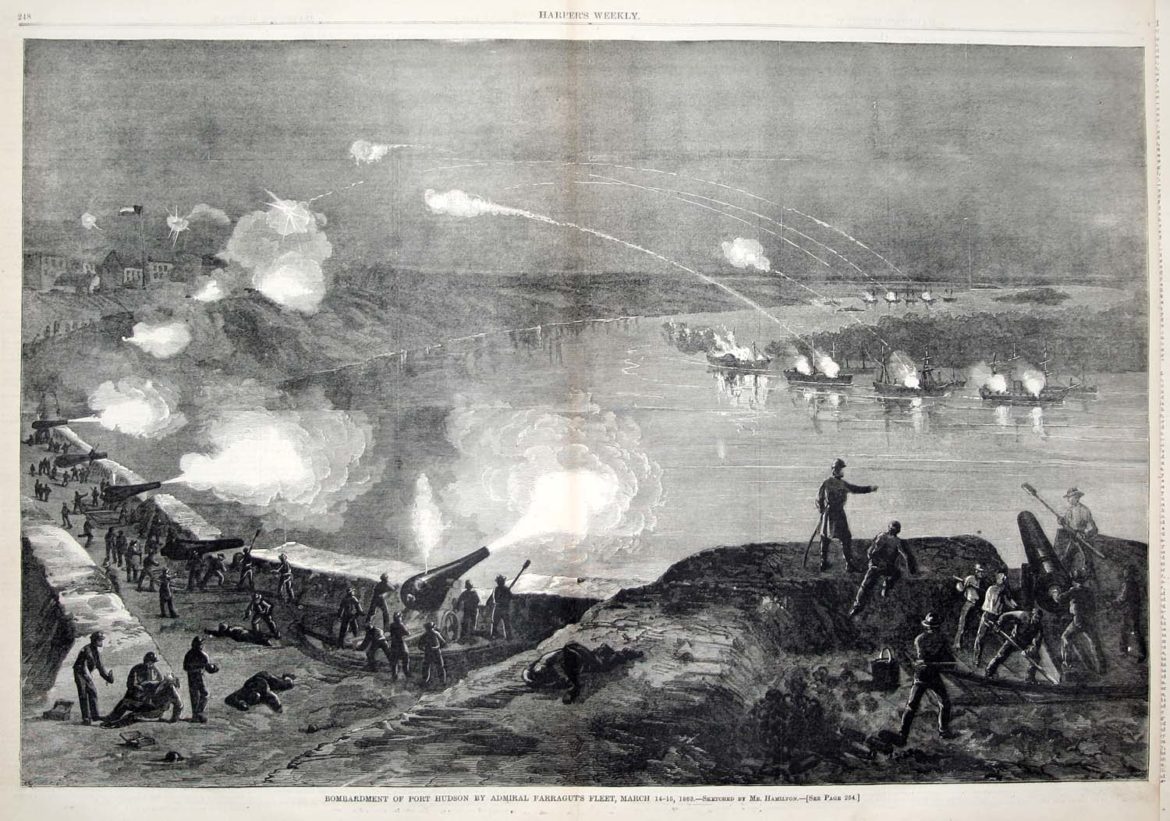Company K First Alabama Regiment
THREE YEARS IN THE CONFEDERATE SERVICE CHAPTER VII
EXPERIENCES OF PAROLED PRISONERS OF WAR
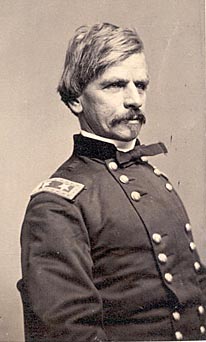
Nathaniel Prentice Banks was an American politician from Massachusetts and a Union general during the Civil War. A millworker by background, Banks was prominent in local debating societies, and his oratorical skills were noted by the Democratic Party.
During the negotiations for the surrender, Gen. Banks refused to grant terms permitting the release of the prisoners on parole, on the ground that orders from Washington positively forbade it. On the day of surrender, however, he suddenly changed his mind and decided to parole all enlisted men, retaining the officers.
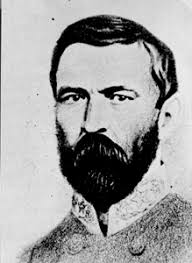
Richard “Dick” Taylor was an American planter, politician, military historian, and Confederate general. Following the outbreak of the American Civil War, Taylor joined the Confederate States Army, serving first as a brigade commander in Virginia, and later as an army commander in the Trans-Mississippi Theater.
Gen. Dick Taylor’s capture of Brashear City, and his nearly succesful attack on Donaldsonville, threatening communication with New Orleans, may have had some influence in causing the change of purpose.
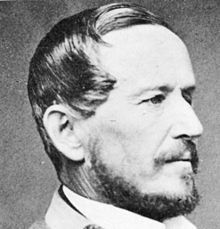
William Wirt Adams was a banker, planter, slave-owner, state legislator, and Brigadier-General in the Confederate States Army.
Gen. Wirt Adams’ audacious dash into Springfield Landing and his destruction of a large amount of commissary supplies stored there, seriously embarrassing the Federal commander in feeding his own troops, also made the paroling of the prisoners advisable. There is no doubt, however, that Gen. Banks was influenced by an honest admiration of the gallantry and fortitude of the garrison, and this was his avowed reason for paroling them. Blanks were at once printed, Private J. C. Rogers, of Co. K, acting as the printer, and on Saturday, July nth, the giving of the paroles began.
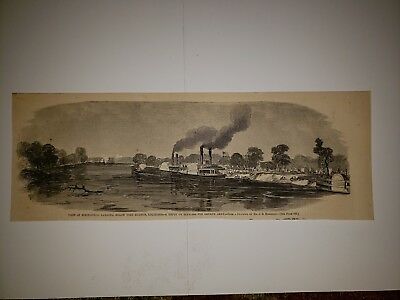
Springfield-Landing-Port-Hudson-Civil-War
The paroling of the First Alabama was completed Tuesday forenoon (the 14th), and in the afternoon the regiment, with the exception of those in the hospitals, bade farewell to their officers and marched out of the fortifications. Of Co. K, but one was left behind—James Herndon, who died a few days later. Altogether, about 500 enlisted men of the garrison were left behind in the hospitals, sick and wounded.
A DISORGANIZED REGIMENT
The regiment kept well together till they were fairly outside the enemy’s lines, and then, in the absence of the commissioned officers, all organization was at an end. About eight miles from Port Hudson the main body of the regiment encamped, but some of the men marched on, and all through the night squads were leaving. No attempt was made in the morning to keep the men together. Maj. Knox, who escaped, and who joined the regiment after it was outside Gen. Banks’ lines, rode forward to secure rations for the regiment, but failed, and we did not see him again till we reached Shubuta, where he made arrangements for our transportation to Mobile.
Most of Co. K, and of the First Alabama, took the direct road to Shubuta, a station on the Mobile and Ohio Railroad. At Clinton Privates J. H. Byrd and A. J. White went to the hospital, where both died on July 25th.
The writer can only give the experiences of a party of eight, of which he was one, on the homeward trip, but all probably fared about alike. Our party consisted of Orderly Sergt. Cameron, Sergt. Fay, Corp. Blaylock, Privates Bledsoe, Hurd, Lamar and Smith and a youth named Dennis, who was with the company but not mustered in. On the second day after leaving Port Hudson, members of the squad purchased a horse, mule and Jersey wagon, with which to carry our baggage and sick.
CLOSE QUARTERS
The wagon had well-worn wooden axles which constantly broke; the horse was sore back and skeletonized, but the mule was a very fair animal. With this team we left Clinton on the morning of the 16th, but just before night halted for repairs, having made fifteen miles. On Friday, the 17th, after the wagon had been overhauled at the wayside smithy, we marched to Tangipahoa, eighteen miles. Two of the party, with the wagon, left early the next morning for Summit, Miss., while the others remained at Clinton till Sunday afternoon, and then took the train on the N. O. & J. Railroad, arriving at Summit at 9, p. m. So soon as we got off the Confederate cavalry burned the train, to prevent it falling into the hands of the enemy. The wagon detail arrived just before the train, having broken down on the road, necessitating the making of two axles.
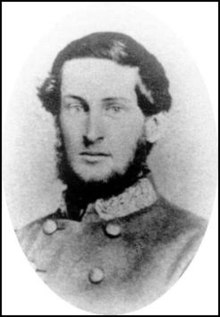
Thomas Muldrup Logan was an American soldier and businessman. He served as a Confederate general during the American Civil War, and afterward was greatly involved in railroad development in the Southern United States.
On Monday morning we started due east for Monticello, and camped after marching twenty-two miles. At 11, a. m., Tuesday, we reached Monticello, where we found Gen. Logan’s command (Confederate) crossing Pearl River. At Tangipahoa we drew rations, and at Monticello Gen. Logan’s commissary honored Sergt. Cameron’s requisition. From Monticello we took the Williamsburg road through the piney woods, scoring for the day twenty-one and one-half miles. Now began daily skirmishes for something to eat, as those who were ahead of us had cleaned the section adjoining the road like a cloud of locusts—there was little left to beg, buy or steal. On Wednesday we scored nineteen and one-half miles, dining, for a consideration, with a probate judge. A shower coming up, we stopped at dusk one mile west of Williamsburg at a log cabin—one room and a shed. The family consisted of a man, his wife, two sons and two daughters. The paroled soldiers who had been passing for two days had nearly drained them of everything, but they treated us very cordially, gave us supper and breakfast of cornbread and bacon, and spread us a pallet of quilts across the floor in front of the fire. With difficulty could they be induced to accept even a trifling compensation. In addition to our party of eight, there were three other soldiers. The lady (poor and ignorant, she was a lady) occupied the shed room with her two daughters, while the host, his two sons and eleven guests slept in the main room. It was our experience all along the route that, while there was no cause of complaint against any, the poor were the more hospitable. Friday night our party went supperless to our blankets in a roadside camp.
Saturday afternoon we arrived at Shubuta, where we found collected a large number of the paroled prisoners awaiting transportation. It was about midnight when the train going south came along. As it was already full to overflowing, those at Shubuta had to climb to the second deck and take passage upon the roofs of the freight cars. It was a ticklish position, but we lay down, secured ourselves as best we could and went to sleep. At 9, a. m., Sunday, the train arrived at Mobile, and the smoke and dust begrimed deck passengers of Co. K wandered down to the river and performed ablutions in rain water collected in a lot of iron salt-boilers lying on the wharf. At 1, p. m., we took the train for Montgomery, whence the members of Co. K soon made their way home.
A FAITHFUL SERVANT
As illustrating the faithfulness of the negro, it is worthy of record that Lamar’s colored boy Floyd, who was with him at Port Hudson, and who soon after the surrender was missing, was awaiting his master with a horse at Washington Landing. He had got into a fight with a Federal negro soldier, knocked him down and then fled, fearing that he would be conscripted into the Federal army, and had made his way home.
John Tarleton died on his way home, near Monticello.
Seven men, Jesse Adams, M. Deno, Haley, M. Hern, Merritt, J. Schein and J. Shoals never afterwards reported to the company : Jesse Adams was known to have made his way to Mobile.
The other members of Co. K succeeded in getting to their homes, where they remained, enjoying a well earned furlough, until Oct. 12, 1863, when the First Alabama was ordered to report at Cahawba, Ala.
A HANDSOME TURNOUT
Of Co. K, according to such imperfect records as the writer has at his command, the following men reported at Cahawba, or soon after at Meridian, Miss.: Orderly Sergeant, Norman Cameron, J. L. Alexander, E. L. Averheart, O. M. Blaylock, J. Boggan, T. M. Boggan, G. R. Bledsoe, C. W. Brown, Wm. Douglass, Wm. Dubose, George M. Durden, J. Durden, W. L. Ellis, W. H. Fay, W. Farmer, Henry Fralick, P. G. Golsan, John Gorman, John Griffin, J. Hamilton, J. C. Hearn, G. W. Hearn, E. Hearn, Joseph Hurd, W. H. Hutchinson, E. Jenkins, J. Killough, V. Kirkpatrick, M. D. Lamar, E. Leysath, J. Lewis, G. F. Martin, J. W. May, Wm. Moncrief, J. Owens, James D. Rice, Junius Robinson, C. H. Royals, G. H, Royals, E. T. Sears, J. H. Shaver, J. L. Simpson, D. P. Smith, A. C. Smyth, A. J. Thompson, John S. Tunnell, Josiah Tunnell, Wm. Vaughn, John Williamson and T. A. Wilson. J. J. Stuart and J. P. Tharp reported not very long after, and R. H. Kirkpatrick was received as a recruit, total 53. There were absent at the hospitals or invalided: R. H. Callens, at Selma, and J. Hays, at Montgomery, both of whom soon after died; S. Glenn, J. C. Rogers, B. L. Scott and F. Wilkins all of whom soon after received discharges for disability. Clark had been transferred to the navy during the summer.
The officers of Co. K, Capt. Whitfield and Lieuts. Pratt, Tuttle and Adams, were taken by boat to New Orleans, and quartered on Rampart street. Here they remained till Sept. 20th. They were then transferred to Johnson’s Island, Lake Erie, where they arrived on Oct. 1, 1863. Lieut. Adams was exchanged in the spring of 1864, rejoining his company in May. Lieut. Pratt was paroled Sept. 16, 1864. Capt. Whitfield and Lieut. Tuttle remained at Johnson’s Island till the close of the war.
PRESENT OR ACCOUNTED FOR
Of the regiment 610 enlisted men reported at the Parole Camp, and about 100 were absent, sick or unaccounted for. Of the regimental officers Maj. Knox was the only one present, the others being at Johnson’s Island. There were about a dozen company officers present; each company, with the exception of K, having one or more representatives.
IN CAMP AT MERIDIAN
On Nov. 10th the regiment arrived at Meridian, Miss., having been assigned to Polk’s Corps, Army of the Mississippi, Gen. Joseph E. Johnston, commanding. Some of the non-commissioned officers of Co. K having requested to be restored to the ranks, the following reorganization was ordered: O. Sergt., Norman Cameron, 2d Sergt., Wm. H. Fay, 3d Sergt., C. Hardie Royals, 4th Sergt., M. D. Lamar, 5th Sergt., D. P. Smith, Corporals, E. L. Averhart, O. M. Blaylock, G. Hearn and J. D. Rice.
Lieut. Haley of Co. G was assigned to the command of Co. K, but was in a few weeks replaced by Lieut. Johnson, of Co. F.
The regiment was armed with new Austrian rifles, and the old routine of drill was once more resumed. Co. K made rapid progress and was complimented by Maj. Knox, by being excused from evening drill after Nov. 26th on account of its proficiency.
On Nov. 25th the regiment received two months’ pay to April 30th, and on Dec. 4th, was paid to Oct. 31st, with all arrearages, including $50 bounty and commutation for clothing; about $125,000 was disbursed to the regiment at this time. A limited amount of clothing was also issued, and some shoes, but the latter were scarce, only 15 pairs to the regiment. Rations were of good quality, and much more plentiful than ever afterwards, consisting of corn meal and a little flour, beef, bacon, sweet potatoes, salt, vinegar and soap. Early in November orders were issued to build log barracks for winter quarters, 18 by 22 feet each designed for 25 men.
The regiment had been declared exchanged on Oct. 16th, but it was soon known in camp that the Federals had denied the validity of the exchange, disputes having arisen in regard to the cartel. In camp the subject was discussed with much interest, especially the question what would be our fate if recaptured by the enemy. Political questions of the day now crept into our camp fire discussions, especially the acts of the Confederate Congress relative to the army. The act restricting furloughs and other privileges and offering in lieu thereof increased pay, also the act forcing men who had put in substitutes to report for duty were subjects of debate, and the former was bitterly denounced.
